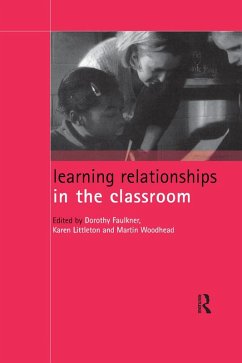Learning Relationships in the Classroom (eBook, ePUB)
Redaktion: Faulkner, Dorothy; Woodhead, Martin; Littleton, Karen
37,95 €
37,95 €
inkl. MwSt.
Sofort per Download lieferbar

19 °P sammeln
37,95 €
Als Download kaufen

37,95 €
inkl. MwSt.
Sofort per Download lieferbar

19 °P sammeln
Jetzt verschenken
Alle Infos zum eBook verschenken
37,95 €
inkl. MwSt.
Sofort per Download lieferbar
Alle Infos zum eBook verschenken

19 °P sammeln
Learning Relationships in the Classroom (eBook, ePUB)
Redaktion: Faulkner, Dorothy; Woodhead, Martin; Littleton, Karen
- Format: ePub
- Merkliste
- Auf die Merkliste
- Bewerten Bewerten
- Teilen
- Produkt teilen
- Produkterinnerung
- Produkterinnerung

Bitte loggen Sie sich zunächst in Ihr Kundenkonto ein oder registrieren Sie sich bei
bücher.de, um das eBook-Abo tolino select nutzen zu können.
Hier können Sie sich einloggen
Hier können Sie sich einloggen
Sie sind bereits eingeloggt. Klicken Sie auf 2. tolino select Abo, um fortzufahren.

Bitte loggen Sie sich zunächst in Ihr Kundenkonto ein oder registrieren Sie sich bei bücher.de, um das eBook-Abo tolino select nutzen zu können.
This reader explores the nature of interactions between children and their teachers in the classroom.
- Geräte: eReader
- mit Kopierschutz
- eBook Hilfe
- Größe: 6.63MB
Andere Kunden interessierten sich auch für
![Dialogue and the Development of Children's Thinking (eBook, ePUB) Dialogue and the Development of Children's Thinking (eBook, ePUB)]() Neil MercerDialogue and the Development of Children's Thinking (eBook, ePUB)45,95 €
Neil MercerDialogue and the Development of Children's Thinking (eBook, ePUB)45,95 €![Computers and the Collaborative Experience of Learning (1994) (eBook, ePUB) Computers and the Collaborative Experience of Learning (1994) (eBook, ePUB)]() Charles CrookComputers and the Collaborative Experience of Learning (1994) (eBook, ePUB)33,95 €
Charles CrookComputers and the Collaborative Experience of Learning (1994) (eBook, ePUB)33,95 €![The Social Psychology of the Classroom (eBook, ePUB) The Social Psychology of the Classroom (eBook, ePUB)]() Elisha BabadThe Social Psychology of the Classroom (eBook, ePUB)46,95 €
Elisha BabadThe Social Psychology of the Classroom (eBook, ePUB)46,95 €![A Teaching Assistant's Guide to Child Development and Psychology in the Classroom (eBook, ePUB) A Teaching Assistant's Guide to Child Development and Psychology in the Classroom (eBook, ePUB)]() Susan BenthamA Teaching Assistant's Guide to Child Development and Psychology in the Classroom (eBook, ePUB)33,95 €
Susan BenthamA Teaching Assistant's Guide to Child Development and Psychology in the Classroom (eBook, ePUB)33,95 €![Handbook of Self-Regulation of Learning and Performance (eBook, ePUB) Handbook of Self-Regulation of Learning and Performance (eBook, ePUB)]() Handbook of Self-Regulation of Learning and Performance (eBook, ePUB)114,95 €
Handbook of Self-Regulation of Learning and Performance (eBook, ePUB)114,95 €![Classroom Discussions in Education (eBook, ePUB) Classroom Discussions in Education (eBook, ePUB)]() P. Karen MurphyClassroom Discussions in Education (eBook, ePUB)33,95 €
P. Karen MurphyClassroom Discussions in Education (eBook, ePUB)33,95 €![The Impact of Technology on Relationships in Educational Settings (eBook, ePUB) The Impact of Technology on Relationships in Educational Settings (eBook, ePUB)]() The Impact of Technology on Relationships in Educational Settings (eBook, ePUB)40,95 €
The Impact of Technology on Relationships in Educational Settings (eBook, ePUB)40,95 €-
-
-
This reader explores the nature of interactions between children and their teachers in the classroom.
Dieser Download kann aus rechtlichen Gründen nur mit Rechnungsadresse in A, B, BG, CY, CZ, D, DK, EW, E, FIN, F, GR, HR, H, IRL, I, LT, L, LR, M, NL, PL, P, R, S, SLO, SK ausgeliefert werden.
Produktdetails
- Produktdetails
- Verlag: Taylor & Francis eBooks
- Seitenzahl: 330
- Erscheinungstermin: 16. Dezember 2013
- Englisch
- ISBN-13: 9781136223372
- Artikelnr.: 40171684
- Verlag: Taylor & Francis eBooks
- Seitenzahl: 330
- Erscheinungstermin: 16. Dezember 2013
- Englisch
- ISBN-13: 9781136223372
- Artikelnr.: 40171684
- Herstellerkennzeichnung Die Herstellerinformationen sind derzeit nicht verfügbar.
Dorothy Faulkner, Karen Littleton, Martin Woodhead
Introduction Part 1: Cultural Psychology: a framework for understanding
teaching and learning 1.L.S. Vygotsky and Contemporary Developmental
Psychology James Wertsch and Peeter Tulviste 2.Cognitive Development and
Formal Schooling: the evidence from cross-cultural research Michael Cole
3.Thinking With and Through Artifacts: the role of psychological tools and
physical artifacts in human learning and cognition Roger Saljo 4.Thinking
in Niches: sociocultural influences on cognitive development Mary Gauvain
Part II: Teaching and Learning: scaffolding and the zone of proximal
development 5.A Theory of Teaching as Assisted Performance Roger Tharoa and
Ronald Galiimore 6.How Do Teachers Help Children to Learn? An Analysis of
Teachers' Interventions in Computer-based Activities Neil Merver and Eunice
Fisher 7,Vygotsky in Classroom Practice: moving from individual
transmission to social transaction Luis C. Moll and Kathryn F. Whitmore
8.What is Missing in the Metaphor of Scaffolding? C.Addison Stone Part III:
Experimental Studies of Collaborative Learning and Peer Interaction
9.Cognitive approaches to Group Work Paul Light and Karen Littleton
10.Exploring Vygotskian Perspectives in Education: the cognitive value of
peer interaction Ellice A. Forman and Courtney B. Cazden 11.Peer
Interactive Minds: developmental, theoretical and methodological Issues
Margarita Azmitia Part IV: Collaborative Learning and Peer Interaction in
the Classroom 12.Sociocultural Processes of Creative Planning in Children's
Playcrafting Jacquelyn Baker-Sennett, Eugene Matusov and Barbara Rogoff
13.Constructing Scientific Knowledge in the Classroom Rosalind Driver,
Hilary Asoko, John Leach, Educardo Mortimer and Philip Scott 14.Sharing
Cognition Through Collective Comprehension Activity Giyoo Hatano and Kayoko
Inagaki 15.Learning and Teaching Mathematics in the Information Era Kathryn
Crawford
teaching and learning 1.L.S. Vygotsky and Contemporary Developmental
Psychology James Wertsch and Peeter Tulviste 2.Cognitive Development and
Formal Schooling: the evidence from cross-cultural research Michael Cole
3.Thinking With and Through Artifacts: the role of psychological tools and
physical artifacts in human learning and cognition Roger Saljo 4.Thinking
in Niches: sociocultural influences on cognitive development Mary Gauvain
Part II: Teaching and Learning: scaffolding and the zone of proximal
development 5.A Theory of Teaching as Assisted Performance Roger Tharoa and
Ronald Galiimore 6.How Do Teachers Help Children to Learn? An Analysis of
Teachers' Interventions in Computer-based Activities Neil Merver and Eunice
Fisher 7,Vygotsky in Classroom Practice: moving from individual
transmission to social transaction Luis C. Moll and Kathryn F. Whitmore
8.What is Missing in the Metaphor of Scaffolding? C.Addison Stone Part III:
Experimental Studies of Collaborative Learning and Peer Interaction
9.Cognitive approaches to Group Work Paul Light and Karen Littleton
10.Exploring Vygotskian Perspectives in Education: the cognitive value of
peer interaction Ellice A. Forman and Courtney B. Cazden 11.Peer
Interactive Minds: developmental, theoretical and methodological Issues
Margarita Azmitia Part IV: Collaborative Learning and Peer Interaction in
the Classroom 12.Sociocultural Processes of Creative Planning in Children's
Playcrafting Jacquelyn Baker-Sennett, Eugene Matusov and Barbara Rogoff
13.Constructing Scientific Knowledge in the Classroom Rosalind Driver,
Hilary Asoko, John Leach, Educardo Mortimer and Philip Scott 14.Sharing
Cognition Through Collective Comprehension Activity Giyoo Hatano and Kayoko
Inagaki 15.Learning and Teaching Mathematics in the Information Era Kathryn
Crawford
Introduction Part 1: Cultural Psychology: a framework for understanding
teaching and learning 1.L.S. Vygotsky and Contemporary Developmental
Psychology James Wertsch and Peeter Tulviste 2.Cognitive Development and
Formal Schooling: the evidence from cross-cultural research Michael Cole
3.Thinking With and Through Artifacts: the role of psychological tools and
physical artifacts in human learning and cognition Roger Saljo 4.Thinking
in Niches: sociocultural influences on cognitive development Mary Gauvain
Part II: Teaching and Learning: scaffolding and the zone of proximal
development 5.A Theory of Teaching as Assisted Performance Roger Tharoa and
Ronald Galiimore 6.How Do Teachers Help Children to Learn? An Analysis of
Teachers' Interventions in Computer-based Activities Neil Merver and Eunice
Fisher 7,Vygotsky in Classroom Practice: moving from individual
transmission to social transaction Luis C. Moll and Kathryn F. Whitmore
8.What is Missing in the Metaphor of Scaffolding? C.Addison Stone Part III:
Experimental Studies of Collaborative Learning and Peer Interaction
9.Cognitive approaches to Group Work Paul Light and Karen Littleton
10.Exploring Vygotskian Perspectives in Education: the cognitive value of
peer interaction Ellice A. Forman and Courtney B. Cazden 11.Peer
Interactive Minds: developmental, theoretical and methodological Issues
Margarita Azmitia Part IV: Collaborative Learning and Peer Interaction in
the Classroom 12.Sociocultural Processes of Creative Planning in Children's
Playcrafting Jacquelyn Baker-Sennett, Eugene Matusov and Barbara Rogoff
13.Constructing Scientific Knowledge in the Classroom Rosalind Driver,
Hilary Asoko, John Leach, Educardo Mortimer and Philip Scott 14.Sharing
Cognition Through Collective Comprehension Activity Giyoo Hatano and Kayoko
Inagaki 15.Learning and Teaching Mathematics in the Information Era Kathryn
Crawford
teaching and learning 1.L.S. Vygotsky and Contemporary Developmental
Psychology James Wertsch and Peeter Tulviste 2.Cognitive Development and
Formal Schooling: the evidence from cross-cultural research Michael Cole
3.Thinking With and Through Artifacts: the role of psychological tools and
physical artifacts in human learning and cognition Roger Saljo 4.Thinking
in Niches: sociocultural influences on cognitive development Mary Gauvain
Part II: Teaching and Learning: scaffolding and the zone of proximal
development 5.A Theory of Teaching as Assisted Performance Roger Tharoa and
Ronald Galiimore 6.How Do Teachers Help Children to Learn? An Analysis of
Teachers' Interventions in Computer-based Activities Neil Merver and Eunice
Fisher 7,Vygotsky in Classroom Practice: moving from individual
transmission to social transaction Luis C. Moll and Kathryn F. Whitmore
8.What is Missing in the Metaphor of Scaffolding? C.Addison Stone Part III:
Experimental Studies of Collaborative Learning and Peer Interaction
9.Cognitive approaches to Group Work Paul Light and Karen Littleton
10.Exploring Vygotskian Perspectives in Education: the cognitive value of
peer interaction Ellice A. Forman and Courtney B. Cazden 11.Peer
Interactive Minds: developmental, theoretical and methodological Issues
Margarita Azmitia Part IV: Collaborative Learning and Peer Interaction in
the Classroom 12.Sociocultural Processes of Creative Planning in Children's
Playcrafting Jacquelyn Baker-Sennett, Eugene Matusov and Barbara Rogoff
13.Constructing Scientific Knowledge in the Classroom Rosalind Driver,
Hilary Asoko, John Leach, Educardo Mortimer and Philip Scott 14.Sharing
Cognition Through Collective Comprehension Activity Giyoo Hatano and Kayoko
Inagaki 15.Learning and Teaching Mathematics in the Information Era Kathryn
Crawford







